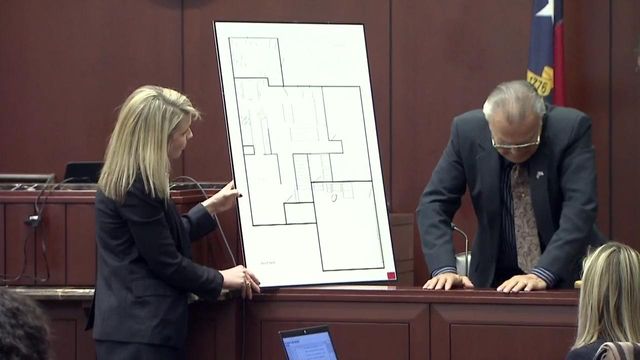Accused killer removed from courtroom during opening day of Wake death penalty trial
Three years to the day that three members of a Wake Forest family were gunned down in their home, the man accused of the crime went on trial Monday.
Posted — UpdatedSal Mazzella, the husband of Elaine Mazzella and the father of Sandy Mazzella, recounted from the witness stand seeing his wife shot. He said Sander had eye black or camouflage makeup on his face when he was inside Sandy and Stephanie Mazzella's home with a shotgun.
"I saw him with a gun pointed at my wife, and I tried to go back in the dining room to get something heavy to hit him over the head, but I didn't have a chance," Sal Mazzella testified. "My wife, once she got shot, she said three words – three words, 'Oh my God' – and that's it. Then she vanished."
He said his son yelled at him to run, so he headed out the front door and ran through the wooded property to a nearby home so someone could call for help.
"I don't even know how I survived. I thought I was shot," he testified.
During the testimony, Sander began yelling that Sal Mazzella had killed his family. Superior Court Judge Graham Shirley ordered deputies to remove Sander from the courtroom and called a recess.
In a motion heard earlier this month, defense attorney Tom Manning told the court that he expected Sander to "act out" during the upcoming trial as he did during the jury selection process.
Sander was shackled as he sat with his attorneys Monday, and Shirley warned him before the trial started that he could use a mask and a special chair to restrain him if he had an outburst during the trial.
After sending the jury out during the afternoon recess, Shirley had Sander brought back into the courtroom and warned him that he would be watching the rest of the trial on a television monitor in a holding cell at the courthouse if he acted out again during the trial.
When the jury returned, the judge instructed them not to consider Sander's shackles as they weigh the evidence and to disregard his outburst because his statements weren't made under oath from the witness stand.
Earlier Monday, Wake County Assistant District Attorney Stacy Newton told jurors in her opening statement that Sander told police after the shooting, "I wanted to kill them so that his family would be hurt just like my family was. ... When I shot Sandy, I felt like I got my revenge."
Sander and the Mazzellas were next-door neighbors on Clearsprings Drive in Wake Forest, and Sander and Sandy Mazzella were in a landscaping business together for several years, Newton said.
But the relationship between the families, who had often gone on vacation and spent holidays together, started going downhill in late 2015 and early 2016, she told jurors. Both families started calling police to register complaints against the other.
According to court records, Sandy and Stephanie Mazzella took out a no-contact order against Sander in February 2016. That same month, Sander was charged with communicating threats against the family, alleging saying he would "put them in a box," according to arrest warrants.
The protective order was lifted March 24, 2016, when a judge refused to make it permanent.
Six days before the shootings, a member of the Mazzella family accused Sander of improperly touching her, prompting an investigation by Child Protective Services, Newton said.
Manning said the accusation enraged Sander.
"He was extremely upset about that," Manning told jurors in his opening statement, "and was very vocal about being very upset."
But Manning maintained that money difficulties from the failing landscaping business were at the root of the disagreement between Sander and the Mazzellas.
Sander's wife worked as the bookkeeper for the business, and she took Sandy Mazzella's name off the company's bank account in late February 2016 because she feared he would drain the account, Manning said. The Mazzellas had frequent financial problems, including having the electricity cut off at home for lack of payment, and often asked for advance payments from the business, Manning said.
"He denies that he killed those three people in that house," Manning said, promising that Sander would testify in his defense. "He denies that he committed first-degree murder in that house."
The girl who accused Sander also testified Monday in a closed courtroom to protect her identity.
Testimony is expected to resume Tuesday morning, and the trial could last up to three weeks.
Related Topics
• Credits
Copyright 2024 by Capitol Broadcasting Company. All rights reserved. This material may not be published, broadcast, rewritten or redistributed.






